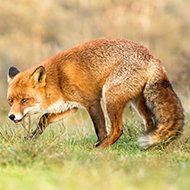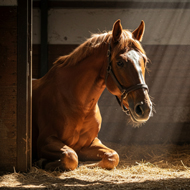Dog faeces a 'significant part' of fox diets, study finds

Researchers discovered that dog faeces have a similar calorific content to the foxes' natural prey - but are far easier to 'hunt'.
Dog faeces make up a significant part of red foxes' diet, a new study has revealed.
Scientists at the University of Aberdeen, the University of Grenoble Alps, Forestry and Land Scotland and Cairngorms Connect collaborated to explore the diet of red foxes in the Scottish Highlands.
Initially conceived to characterise the diet of foxes and pine martens to gain a better understanding of how the two species coexist, the study revealed the connection between dog faeces and fox diet for the first time in scientific record.
Using metabarcoding, a technique based on DNA-based identification and rapid DNA sequencing, researchers were surprised to discover that domestic dog DNA was the second most frequent species in fox stool samples.
With almost 40 per cent frequency of dog DNA in fox samples, but absent in pine marten samples, the researchers put forward many hypotheses to explain the matter, including the possibility of confusion between dog and fox DNA, given the closely-related nature of the species.
Ultimately the research team concluded that the foxes had eaten dog faeces, with the faeces becoming an important food source when the availability wild prey fluctuates.
Cristian Navarro, PhD student at the University of Aberdeen co-authored the study. He said: “The fact that foxes consume dog faeces in the amounts we have found is unprecedented.
“Rabbits and other related species are well-known to consume their own faeces but consumption of the faeces of another species has seldom been documented and likely represents an overlooked interaction among wild animals.
“This phenomenon would be undetectable through traditional diet study methods, but by using DNA-based techniques our study has revealed this interaction for the first time, leading to important questions about how human activities are affecting wildlife.”
The study acknowledges both the benefits and risks of this interspecies interaction, highlighting the potential for pathogenic or parasitic infection, but also the assistance given to the foxes to protect them when resources are unavailable.
Ultimately, the researchers concluded that the potential gains outweigh the potential drawbacks. However, the incidence of pathogens circulating and vaccination status of the domestic dog population will affect the level of risk involved.
Professor Xavier Lambin, co-author of the paper, explained: “Just like how bird feeders in gardens benefit some species of birds while others are displaced, dog faeces may benefit foxes over their competitors or prey species.
“In addition, the availability of dog faeces and their consumption by wild animals creates risks of disease and parasite transmission, and of introducing new pathogens.
“This highlights the need for a holistic management approach, including the need for measures to help ensure the appropriate use of outdoor spaces by dog walkers, given the potential impacts.”
Also co-authored by Dr Catherine Hambly, Kenny Kortland, Dr Eric Coissac and Dr Pierre Taberlet, 'Interspecific coprophagia by wild red foxes: DNA metabarcoding reveals a potentially widespread form of commensalism among animals' is published in Ecology and Evolution.



 Zoetis UK has called on horse owners to complete a short online survey about their horse's behaviours.
Zoetis UK has called on horse owners to complete a short online survey about their horse's behaviours.